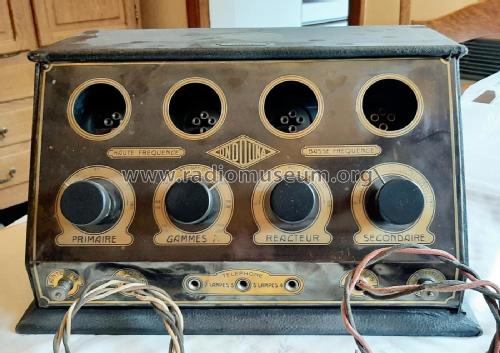Ondolina 1924 - 1st gen. - front 2
SBR Société Belge Radio-Electrique, Bruxelles
- Paese
- Belgio
- Produttore / Marca
- SBR Société Belge Radio-Electrique, Bruxelles
- Anno
- 1924

- Categoria
- Radio (o sintonizzatore del dopoguerra WW2)
- Radiomuseum.org ID
- 228357
Clicca sulla miniatura dello schema per richiederlo come documento gratuito.
- Numero di tubi
- 4
- Principio generale
- A reazione (con rigenerazione); 2 Stadi BF
- N. di circuiti accordati
- 2 Circuiti Mod. Amp. (AM)
- Gamme d'onda
- Onde medie (OM) e onde lunghe (OL).
- Tensioni di funzionamento
- Batterie (di accumulatori e/o a secco) / 4 & 80 & -4.5 Volt
- Altoparlante
- - Questo apparecchio richiede altoparlante/i esterno/i.
- Materiali
- Mobile in legno, valvole visibili.
- Radiomuseum.org
- Modello: Ondolina [1924 - 1st gen. - front 2] - SBR Société Belge Radio-
- Forma
- Soprammobile a leggio (pannello inclinato).
- Annotazioni
-
The early Ondolina desk models were built in the period 1923-1927 and can be characterized by the year of construction, the generation and type of front.
- Model 1924 (1st gen - front 1) with bronze front and silvery labels has 3 connectors for the headphone or loudspeaker, one for each sound level depending on the number of amplifying tubes (2, 3 or 4). The power wires are connected to the front. Reduction knobs (for fine tuning) on the primary and secondary tuning capacitors are optional. Like all models up till model 1927 (2nd gen.), this model is provided with an internal negative grid 4,5 V battery.
Alternative tube set: 4 x R5 or Marconi ‘R’ or Philips E, also for the following models up till model 1926. - Model 1924 (1st gen - front 2) has a bronze front and brass-colored labels.
- Model 1924 (2nd gen) with bronze front and brass-colored labels has only 2 connectors for headphone or loudspeaker. The middle one is replaced by a light bulb, serving as fuse.
- Model 1925 (front 1) with bronze front and brass-colored labels has a volume switch instead of the light bulb. The power wires are connected to the back panel.
- Model 1925 (front 2) has an aluminum front with black characters.
- Model 1926 also has an aluminum front with black characters. A reduction knob becomes standard on the secondary tuning capacitor, the other one is still optional. There are 2 rheostats for the filaments. Following tubes were recommended up till model 1927 (2nd gen): A410, A410, A410, A406 or B406.
- Model 1926 [Réseau] is a combination of model 1926 with a power supply in a wooden case, mounted under the model.
- Model 1927 (1st gen) has a bronze front with silvery labels. Power wires are still on the back panel.
- Model 1927 (2nd gen - front 1) has a bronze front with silvery labels, with serial number 254913 and up. Power connectors on the back panel instead of wires and no built-in negative grid 4,5 V battery anymore. The negative grid voltage remains necessary but must be supplied by an external battery.
- Model 1927 (2nd gen. - front 2) has a brass front with black labels.
- Model 1927 (2nd gen. - front 3) has a brass front with copper-colored labels.
These Ondolina models could also be operated with an external power supply, type Résolina or type M30. In that case, the negative grid voltage battery was still necessary, since the mentioned power supplies couldn’t provide that voltage.
- Model 1924 (1st gen - front 1) with bronze front and silvery labels has 3 connectors for the headphone or loudspeaker, one for each sound level depending on the number of amplifying tubes (2, 3 or 4). The power wires are connected to the front. Reduction knobs (for fine tuning) on the primary and secondary tuning capacitors are optional. Like all models up till model 1927 (2nd gen.), this model is provided with an internal negative grid 4,5 V battery.
- Autore
- Modello inviato da Dirk Bladt. Utilizzare "Proponi modifica" per inviare ulteriori dati.
- Altri modelli
-
In questo link sono elencati 735 modelli, di cui 682 con immagini e 418 con schemi.
Elenco delle radio e altri apparecchi della SBR Société Belge Radio-Electrique, Bruxelles



